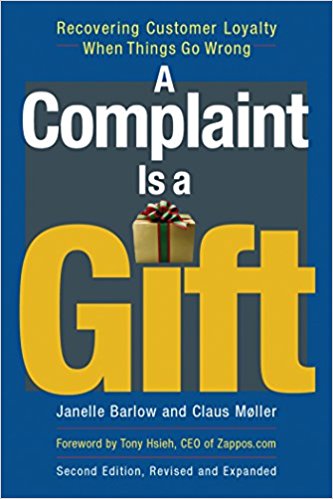A Complaint Is A Gift Summary
6 min read ⌚
 Recovering Customer Loyalty When Things Go Wrong
Recovering Customer Loyalty When Things Go Wrong
Customers are gold, and the business should revolve around their needs, not your agenda.
Experienced managers and marketers realize that understanding their position is like having the wind at your back!
In this book summary, we try to melt all the vital info and lay the foundations for a new strategy.
Who Should Read “A Complaint Is A Gift”? And Why?
If you ever plan to run a business or expand your expertise regarding CRM, this book should be on your pending list!
We believe that “A Complaint Is A Gift” is like a research bomb, whose clock is already ticking.
Therefore, newcomers in the world of managers, business experts, and marketers need to dive right into the essence of this masterpiece and use its sources to devise better plans.
About Janelle Barlow
 Janelle Barlow is an expert in customer behavior and the president and owner of TMI US. Her contribution to customer-management is out of the question.
Janelle Barlow is an expert in customer behavior and the president and owner of TMI US. Her contribution to customer-management is out of the question.
Despite being the author of four books including (Emotional Value), she has also provided many top-notch brands with consulting services!
“A Complaint Is A Gift PDF Summary”
If you didn’t see this one coming – we have to explain that receiving complaints doesn’t reflect “The End of the World.” Truly, there’s a number of useful practices that can help you understand the big picture. For instance, you can accelerate your business career by knowing how to interpret complaints and appreciate their effect.
If companies can begin to see complaints as gifts, it will open an entirely new path for interacting with customers and benefit everyone.
Janelle insists on observing especially highly-negative complaints as messages, which help you steer your company. In other words, using this vital info can give you the upper hand in defeating your rivals. You don’t need us telling you that this is not the industrial era – for every action, there is a suitable reaction.
So, why gifts?
There’s one thing to keep in mind – if you decide to conduct an analysis regarding consumer behavior, or if you endeavor to make heads and tails of something, you need valuable and sincere feedback from the other party.
In this case, that other legal body/union/group/association are your customers. If you label yourself as a customer-centric organization that is not merely profit-driven, you have to put customer behavior on top of your priorities.
Their feedback is priceless because it directs your company on the right path. Always be passionate about complainers, they are your corner guy! Make them feel like you care for their objection.
Fortunately, Janelle Barlow designed 8 Step Fundamental Technique – named The Gift Formula that helps you determine what to do in which situation.
Here’s how to do it:
- Say, “Thank you.”
Expressing gratitude means that you are not biased when it comes to the company’s performance and you take all notes into account. On top of that, you don’t evaluate nor verify the legitimacy of the complaint.
When it’s your birthday, and you receive a gift – we assume you don’t ask nor demand specifications about the present. Where it was purchased, how much it costs, who bought it, and so forth. Whether you need it or not, it’s polite to say “Thank You.”
- Explain why you appreciate the feedback.
Customers love their needs to be met, and you can’t do much better than explaining your official status about the quarrel.
You know the old one? – The customer is always right! That means, even if they don’t have trustworthy arguments you must put their interests above yours.
- Apologize for the mistake.
Do you have to apologize for specific errors in the process? – Indeed, but only after you complete the first two stages, and created an official stand about the problem.
If you merely apologize, the customer would feel as if the company plans to do nothing, and their feedback means very little to you. Give them a feeling that the organization is working on improvements to meet their needs.
- Promise to do something about the problem immediately. Take responsibility.
What customers value the most? – To be involved in the process of decision-making! It’s sound a bit strange that a one-time customer can dictate your operations, but it’s the only path you should take.
Start by saying what and how fast you plan to fix the problem to change their opinion.
- Ask for necessary information.
If you monitor these processes or if you are one of the employees who handle customer complaints, you need to possess certain expertise and full-knowingness of the tunnel for dealing with such issues.
Making the customer feel pleased with the company’s efforts, is vital to keep the organization functional. A significant portion of these complainers don’t expect any action on your behalf; they just want to share their issue with the organization.
- Correct the mistake – promptly.
Well, speed does matter. Look at it this way, you go to an expensive restaurant, and you order caviar and wine for you and your lovely lady. The waiter accepts the order but delivers it 50 minutes after the initial demand is made. What would be your response?
Your patience has expired, and even if the food is delicious, your overall experience with the restaurant is not that great. Fixing any issue at lightning speed is critical for transforming these unhappy customers into loyal “subjects.”
- Check customer satisfaction.
After you completed all these steps in the process, it’s vital to assess the customer satisfaction and see whether their aversion is starting to fade away.
Make a call is one way to do it and ask whether the solution to the problem satisfies their appetites. In some rare occasion, you can also share the precautions taken to prevent the issue from occurring again.
- Prevent future mistakes.
Train your staff to avoid similar mistakes in the future. Make sure that you don’t pass the blame on them, always take “We” instead of “You” “I” “He” “She,” that way you’ll make everyone equally responsible for both successes and failures.
If you display excellent management skills, your staff members will eagerly put your instructions into action and implement the solution to its full extent.
Key Lessons from “A Complaint Is A Gift”
1. The customers are your most precious jewel
2. You are not right
3. Take one step at the time
The customers are your most precious jewel
Profit-driven companies hit the bottom quicker than you ever thought possible.
We are not saying that you should not be making money, that is absurd, but your primary incentive must be making the end user happy and satisfied.
You are not right
If you have all the arguments in the world to prove the customer wrong; you’ll still be leaning towards the losing side!
It’s not what you can prove, or how well you can contradict the consumer’s statements, but how you handle complaints.
Take one step at the time
Don’t simply rush into conclusions; making split second-decision won’t do you any good. To deliver a superior product, you have to execute all steps with utmost perfection.
In doing so, you’ll build a strong base of loyal admirers!
Like this summary? We’d Like to invite you to download our free 12 min app, for more amazing summaries and audiobooks.
“A Complaint Is A Gift Quotes”
If companies can begin to see complaints as gifts, it will open an entirely new path for interacting with customers and benefit everyone. Share on X We must welcome these complaining customers and make them want to come to us with their feedback. Share on X Without open communication between front-line personnel and managers, service quality is very difficult to achieve. Share on X Poorly written policies encourage front-line employees to pay more attention to enforcing company rules than satisfying upset customers. Share on X Organizations need to encourage staff to seek out complaints because this will define what customers want. Share on XOur Critical Review
Your customers don’t feel pity for you, and they expect something in return for either their time or money.
Janelle teaches you how to make the most out of any situation by advocating for superior-quality.
Emir is the Head of Marketing at 12min. In his spare time, he loves to meditate and play soccer.


 Recovering Customer Loyalty When Things Go Wrong
Recovering Customer Loyalty When Things Go Wrong




